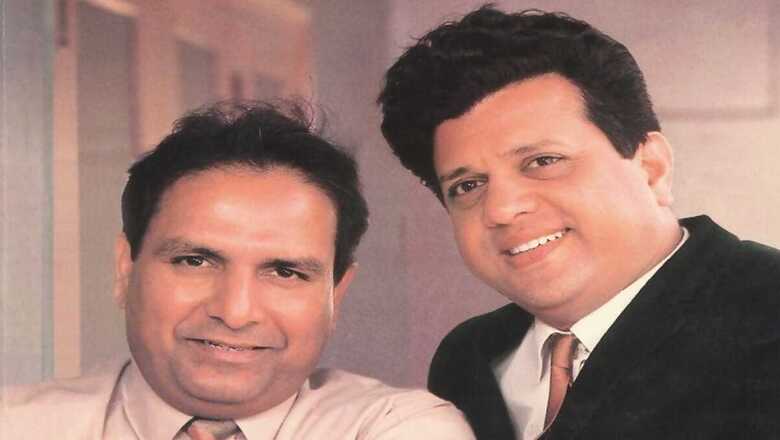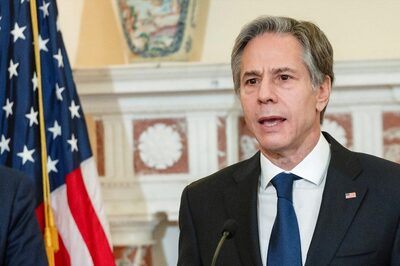
views
Ours is an era of listening and forgetting. Too many new songs are composed, and most disappear from our minds soon after we hear them.
However, those fond of the music of Bollywood’s Golden Age—the period between the 1950s and 1970s—will insist that many songs composed back then are unforgettable. And, isn’t it true? Among the maestros of those times is the composing duo of Shankar Singh Raghuvanshi and Jaikishan Panchal, popularly known as Shankar-Jaikishan.
April 26, 1987, was the day when Shankar, the senior of the two, left this world. Born on October 15, 1922, in Hyderabad, he learned the tabla as a youngster. It is said that he also learned some wrestling and Kathak dance. After joining Prithvi Theatre in the-then Bombay, he played the tabla, did minor roles in plays and learned other instruments such as the sitar and piano.
Shankar also assisted Husnlal Bhagatram, the first composing duo of Bollywood. He met Jaikishan, a young harmonium player from Gujarat, in the office of Gujarati film producer Chandravadan Bhatt. He promised him the job of a harmonium player at Prithvi Theatre, which Jaikishan got, and the two eventually became good friends.
Working as a team, Shankar-Jaikishan assisted music director Ram Ganguly, who composed the music for Raj Kapoor’s debut directorial Aag (1948). However, Kapoor replaced Ganguly with the young duo during the making of Barsaat (1949), as a result of which the latter made their debut as music directors in the film. Among their classics from Barsaat are the famous Lata Mangeshkar solos “Hawa Mein Udta Jaaye,” “Jiya Beqarar Hai” and “Barsaat Mein Humse Mile.” How did these first-time composers—born on November 4, 1929, Jaikishan had barely crossed his teenage phase – do such outstanding work in their first album? The fact is that they did. The passage of time proved that they were phenomenal talents capable of composing a wide range of songs with diverse musical elements that sparkled with inventiveness.
Music cannot be created in isolation. Often referred to by the acronym S-J, the gifted composing duo collaborated with several would-be legends of Hindi film music. Among those who wrote the lyrics for their songs were Shailendra, Hasrat Jaipuri, Majrooh Sultanpuri, Gulshan Bawra, Indeevar and Rajinder Krishan. Their list of singers had names like Lata Mangeshkar, Mohammed Rafi, Asha Bhosle, Mukesh and Manna Dey, who sang most of their popular songs. The writing was frequently brilliant, the singing equally fascinating. Working in such an era, S-J flourished.
Versatility was their compositional USP, which created opportunities for singers to demonstrate their skills and range. Fans of old songs continue to revisit “Dost Dost Na Raha,” whose lyrics evoke deep melancholy, from Sangam (1964). Its greatness as an emotionally moving song is because of three reasons: a superb tune, Shailendra’s lyrics and Mukesh’s memorable performance. In the soundtrack of Dil Apna Aur Preet Parai (1960) is “Ajeeb Dastan Hai Yeh” sung by Mangeshkar, whose evocative lyrics (also Shailendra) heighten the power of its haunting melody.
Musical explorers who knew no boundaries, S-J knew how to make the most of the talent at their disposal. It is impossible to think that anyone apart from Mangeshkar and Dey could have sung a lively song like “Pyar Hua Iqrar Hua” in Shree 420 (1955). “Mera Joota Hai Japani”, also from the same film, was perfect for Mukesh. “Mera Joota Hai Japani’”s melody and lyrics (Shailendra) became hugely popular, and Salman Rushdie included an English translation of its first few lines in his controversial novel The Satanic Verses. Of course, the title of a Shah Rukh Khan film is a phrase from the song: Phir Bhi Dil Hai Hindustani.
S-J knew the fine art of incorporating raw energy in a song, as they famously did in “Chahe Koi Mujhe Junglee Kahe,” the pop classic in Junglee (1961). The ‘yahoo’ in the song did not appeal to its singer Rafi, and screenwriter Prayagraj had to step in to utter that one famous word. The introduction of Prayagraj for an inspired moment showed S-J’s deep awareness of how an offbeat experiment could heighten the appeal of a song.
When they composed “Kisi Ki Muskurahaton Pe” for Anari (1959) sung by Mukesh, they introduced an elaborate orchestral arrangement at the outset and included a whistling portion, which was short but unforgettable. In “Ruk Jaa O Jaanewali” sung by Mukesh in Kanhaiya (1959), there is a much shorter instrumental phrase after “Ruk Jaa”. Some would say it is a minor touch, and it is, but it is a moment that lives on in the mind long after the song is over.
S-J’s renowned ability to take the classical route has glorious instances, such as “Jhanak Jhanak Tori Baaje Payaliya” based on Raag Darbari Kanada in Mere Huzoor (1968) sung by Manna Dey and “Re Man Sur Mein Ga, Koi Taar Besur Na Bole” based on Raag Yaman in Lal Pathhar (1971) sung by Dey and Bhosle. Raag Bhairavi’s influence in several of their songs has been frequently discussed, and one of their most well-knit compositions based on the raag is “Kaise Samjhaoon Badi Nasamajh Ho”, a Rafi-Bhosle duet in Suraj (1966). When the body of their work is assessed in its entirety, however, the highlight that none can miss is their passion for diversity in their compositions.
After Jaikishan died in 1971, Shankar composed solo as Shankar-Jaikishan. However, the popularity S-J enjoyed before Jaikishan’s death on September 12, 1971, faded away. Several films for which he composed music failed, which was the main reason for the dramatic decline. A rare prominent musical hit of the post-Jaikishan era was Sanyasi (1975), but its success was eclipsed by several other soundtracks that did not make an impact.
Shankar’s death in 1987 ended a chapter in the history of Hindi film music, which had many unforgettable memories of songs created and performed by the best. Those were glorious times—a period modern-day Bollywood can learn from.
The writer, a journalist for three decades, writes on literature and pop culture. Views expressed in the above piece are personal and solely those of the author. They do not necessarily reflect News18’s views.

















Comments
0 comment